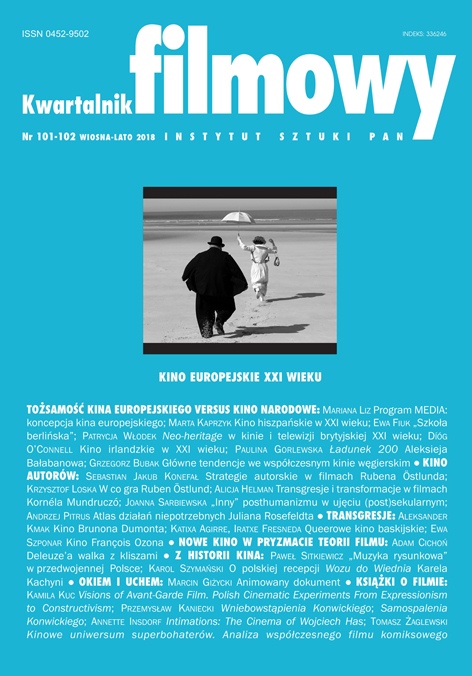Psychologiczny balecik w konkretnym układzie sił. O polskiej recepcji „Wozu do Wiednia” Karela Kachyni
Psychological Ballet In a Specific Configuration of Power. On the Polish Reception of the “Carriage To Vienna” by Karel Kachyňa
Author(s): Karol SzymańskiSubject(s): Fine Arts / Performing Arts, Visual Arts, Film / Cinema / Cinematography
Published by: Instytut Sztuki Polskiej Akademii Nauk
Keywords: Kachyňa Karel;Czechoslovak cinema;
Summary/Abstract: “Carriage to Vienna” (“Kočár do Vídně”) – a masterpiece of the Czechoslovak cinema from 1966, directed by Karel Kachyňa and based on the script by Jan Procházka – aroused extremely divergent opinions in Poland in the years 1966-1967. Objections to the film taking place in the last days of the Second World War focused on three themes: scandal in response to the romantic relationship between a Czech girl and a soldier of a hostile army, opposition to the non-heroic way of showing guerrillas and outrage at the positive figure of a “nice German”. The critics of the “Carriage to Vienna” formulated their accusations with an unusually sharp and aggressive language, using the extensive repertoire of stylistic and rhetorical means of the communist language. According to Szymański, the rhetoric of moral indignation and intellectual disagreement with the message of the film present in the reviews was underlined with an ideological discourse, consistent with the policy of the Polish United Workers’ Party, which used primarily the so called German deterrent, Czech resentment and accusations of revisionism towards Czechoslovakia seeking “socialism with a human face”. All these elements of the discourse had been used in Poland, in 1968, in order to legitimize the final showdown with the Prague Spring and the use of Warsaw Pact troops. Therefore Szymański sees in the reception of the “Carriage to Vienna”, on the one hand, the testing (prior to the course of events) – on the micro scale and on the secondary front of artistic criticism – of the means of the later anti-Czech propaganda action, and on the other – a symptom, earlier than previously thought, of the daily ideological indoctrination of the Polish People’s Republic at the stage of methodical and intentional propaganda campaign directed against Czechoslovakia.
Journal: Kwartalnik Filmowy
- Issue Year: 2018
- Issue No: 101-102
- Page Range: 275-299
- Page Count: 25
- Language: Polish

